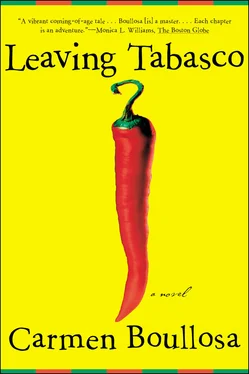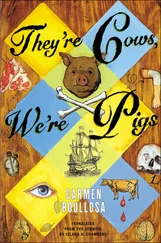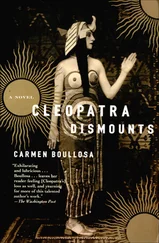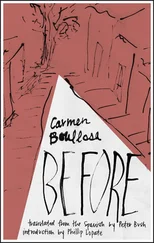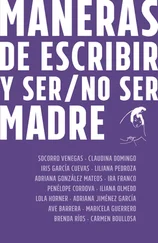“‘You’re not going to stay and sleep here?’ asked my idiot of a grandmother.
“‘We wouldn’t sleep in this pigsty, madam, thanks very much all the same,’ said the chief sarcastically, now wearing bits and pieces of my mother’s and grandmother’s clothes over my father’s best pair of trousers. Then he climbed on his horse and disappeared, followed by his drunken gang.
“The next day we moved here. We never went back to the farm, because Mama got sick again and died a short while after. Died just as she’d lived, without ever cutting her hair even once. When she let it down, it reached to her ankles, you know. Papa followed her to the grave in next to no time, and Grandma María del Mar did the same a few weeks later. So the four of us were left to fend for ourselves, though we did have the help of Papa’s brother, who managed our inheritance with absolute honesty. Though only because we didn’t give him time to steal it from us. Then, as fast as we could, each of us found a husband. My three sisters had first-rate luck, because, I suppose, they were the only ones from the upper classes still around here at that time. Three good husbands they picked out for themselves. And me? Well, I got what I got, a complete good-for-nothing. The only memorable thing he ever did was die early. That’s what happens when you’re the last one. You get the leftovers.”
The following Sunday we didn’t join the priest on his rural jaunt, because that morning, around eight o’clock, all the birds, regardless of their mode of flight, whether they moved in wide circles or just enormous curves before gliding slowly onward, or rocked to and fro and leaned to one side in mid-flight, or floated low over field and swamp, their wings slightly above the horizontal plane, or executed a variety of short, rapid flutterings or flew by alternating fluttering with gliding or made a habit of hanging suspended in the air, beating their wings and coming down feet-first to fish, or soared upward in great circles — one and all came tumbling beakfirst to the ground, unable to get airborne again. One after another, they opened their wings to fly but all came back down to earth, walking on their feet like defenseless creatures in need of shoes. The roadrunners didn’t notice the change, nor did the ducks which lived hidden among the rushes of the swamp, stuck in the mud, scratching the backs of the fishes. But tick-eaters couldn’t get off the ground and back onto the necks of the cows, and the American tree-climber, which winds its way up the trunks of trees and then drops to the base of the next tree, couldn’t even flutter a short distance to help itself climb to safety. All around, the birds made efforts to take off, but they ended up falling back to earth, sometimes beating their wings but not always, as if some heavy air were suddenly circulating through their bones, an air laden with water or weighted with earth, almost sandy.
Before our eyes, the cats and dogs launched into a gory butchery, glutting themselves on this luxurious banquet, till they were sated and smeared with the blood of the birds. Before long we saw even eagles harassed by quadrupeds. Hummingbirds, beating their wings a thousand times a minute, couldn’t get off the ground, buffeting their attackers with their wings before dying in a mixture of saliva and blood. We dashed to defend the birds, while others stashed the rarer specimens in cages or what they could improvise as cages, bundling in this repugnant treasure before my eyes.
The hourly bus had not yet come into town, but when it did, sounding the horn to get the birds to move aside and give it some space, its luggage rack was packed with a multitude of exotic birds I’d never seen before. The highways were infested with creatures that should have been flying. It was one thing to crush common zanates and guitos under your wheels but a far different thing to run down a green-billed toucan or a white-horned owl or an immense scarlet guayacama, a parrot, a scissor-bird, a lily-galloper, an owl from the bell tower with its white, heart-shaped face, a handsome quetzal with its long tail, an eagle or a kingfisher. The passengers unloaded their luggage from the bus, but it wasn’t easy to find a place to put it, for the birds on the roof joined the already thronged sidewalk, cluttered with love-birds and pigeons, trogons and cuclillos, cezontles and tanagers and red cardinals. The patios of houses were also thronged with various birds, terraces and rooftops likewise, and if the tiles were sloping, the birds eventually fell off them down onto the ground with a distressing gracelessness, for by now they had lost even the capacity to flutter. They were walking along the sidewalks and the paths of the park in a stately fashion, and just as they had previously formed flocks in the sky, so now they formed them down on the earth, strutting around in serried ranks of feathers, which made it awkward for people to get around the town, as the birds closed ranks impenetrably, and the people had to take other routes where other birds, less given to parading about, left spaces on the ground.
We chained up the dogs, we shut the cats in the house as best we could. Mothers spanked some children for tormenting the defenseless birds and shooed away the more aggressive birds from other, more peace-loving children. Traffic was brought to a standstill, whether motor-driven or horse-drawn. We tried not to worry about what had happened, as if it were quite normal to live in a town where there were more feathers than dust and mud. The teacher from the secondary school borrowed nets from the fishermen and organized his students to rescue the birds that were drowning after falling into the river.
Mass was interrupted by the calls of birds that filled the atrium and the floor of the church, some calls resembling those of frogs, others harsh and heartbreaking, repeated cla-acks , or nonstop cacklings or a chatter of castanets that froze your soul. Or flick-a, flick-a , or wick-wick , or a deep uchrrrrr followed by a sharp pi , or a gruff chifti-chifti , or sometimes a slow, piglike grunting, an oink, or two or three sadder, more desolate sighings that died away gradually in intensity and rhythm. Or a switsit or was it a psiit or a siist with a rising inflection? Then a hooy-see , a peetsee-oh , sharp and explosive, a tee-dee-day , a chur-wee , a musical troolee , but since there wasn’t a single specimen of the gray musketeer whose song resembles the priest’s “Joseph’n Mary, Joseph’n Mary” around to help him, he couldn’t concentrate on the ceremony.
The breakfast likewise was disrupted by the same hullabaloo. Wordlessly the sisters gazed at their caged birds, till one of them said, “Well, if it’s up to me, they can fly away.” Another then opened the cages, but only one sparrow tried to escape and it crashed down onto the floor of the terrace, like a small bag of dried corn, and severely injured its beak. From the priest’s garden a rare black and white owl stared at us with its enormous eyes. Its back and face were black and it never once took its eyes off us, continually going hooey-oo-oo , a dolorous song that hardly went well with the morning light. Now and then our talk was interrupted by a monotonous, grating k-rrrk or g-rrrk , like a giant grasshopper’s, but actually coming from a toucan. That morning there was no chatter about the state of the tablecloth; the vegetation embroidered on it was allowed to remain undisturbed. The nuns quickly cleared the table, and the priest, visibly shaken, mounted his horse and trotted off as fast as he could, picking his way through feathery obstacles, and we didn’t see him again for the next three days.
Читать дальше
